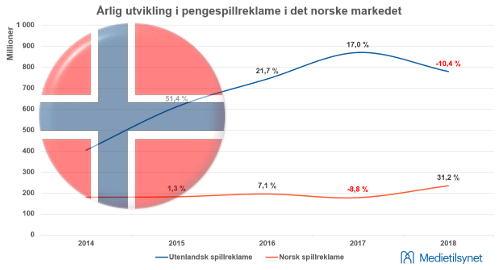 Norway’s efforts to crack down on unauthorized international online gambling rivals appear to be working, at least on television.
Norway’s efforts to crack down on unauthorized international online gambling rivals appear to be working, at least on television.
Last week, Norway’s official government media authority Medietilsysnet announced that Norwegian-facing gambling operators’ spending on television advertising between August 2017 and July 2018 fell by 3% compared to the previous year. It’s the first such decline since Medietilsysnet began compiling its TV advertising stats in 2013.
Medietilsysnet director Mari Velsand said the decline was due to a 10.4% spending reduction by foreign gambling operators like Betsson and the Kindred Group’s Unibet brand. Conversely, spending by domestic monopoly operators Norsk Tipping, Rikstoto and Pantelotteriet increased by 31.2% over the same span.
Velsand cautioned that while international operators’ spending may have fallen, they still account for roughly three-quarters of the market’s estimated NOK1b (US$116.2m) in total advertising spending via TV channels available to Norwegian viewers. (Medietilsysnet cautioned that the overall number is based on published advertising rates and individual network discounts mean the real spending figure is likely lower.)
Gunn Merete Paulsen, the recently appointed chief of the Lotteri-og Stiftelsestilsynet (Norwegian Gaming Authority), celebrated the new advertising stats, saying the “big reduction in such marketing [by international sites] can be a sign that regulatory measures have taken place and that the trend has now reversed.”
One year ago, Norway’s culture minister announced plans to cut down on the volume of unauthorized gambling promos beaming their signals into Norwegian homes from outside the country. The measure is but one plank of the country’s efforts to safeguard its domestic monopolies from foreign competition, including DNS blocking of unauthorized domains and cutting off these internationally licensed rapscallions’ access to Norwegian payment channels.
Paulsen cautioned that the domestic monopolies needed to ensure that their increased marketing presence on Norwegian television “does not go beyond the intention of channeling customers to the safe regulated money game offerings.”